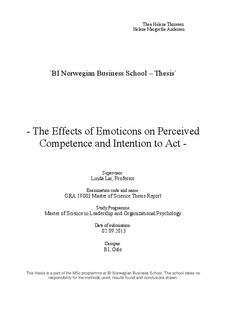The effects of emoticons on perceived competence and intention to act
Master thesis
Permanent lenke
http://hdl.handle.net/11250/95129Utgivelsesdato
2014-02-12Metadata
Vis full innførselSamlinger
- Master of Science [1621]
Sammendrag
The current study explores the effects of emoticon use in organizational communication in a socio-psychological context. More specifically, we examined the effect emoticons have on a) targets` perception of an agent`s competence, and b) a target's intention to act based on an agent`s request. We investigated the potential moderating effects of organizational roles, gender, and age. Through a pilot study and two experiments, we were able to detect a significant, negative relationship between the use of emoticons (presented as ―smileys‖) and how targets perceived the competence of an agent. The participants perceived the sender of an e-mail as less competent when emoticons were included in the e-mail relative to when they were not included. The relationship between use of emoticons and intention to act was not significant, nor did we find any significant results when the moderating variables were included. We did, however, detect some surprising observations concerning gender. The results revealed that men discriminate against women, and women discriminate against men, when it comes to perceptions of competence and intention to act, regardless of emoticon use. These observed tendencies contradict previous beliefs that female as well as male evaluators generally tend to discriminate against women.
Beskrivelse
Masteroppgave(MSc) in Master of Science in Leadership and Organizational Psychology - Handelshøyskolen BI, 2014
